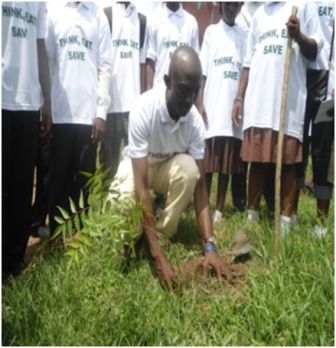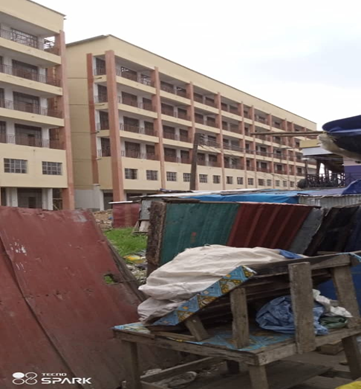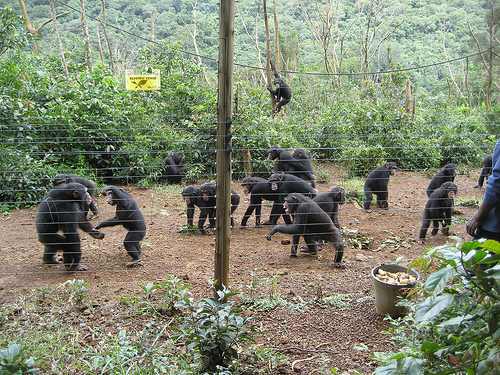UNDP Country Director calls for protection of Aberdeen Creek and Sierra Leone’s ocean
Plastic waste threatens future of Sierra Leone’s oceans, entire environment
Freetown, Monday 8 June 2015: UN Development Programme Country Director in Sierra Leone, Sudipto Mukerjee has called for serious action to protect Freetown’s Aberdeen Creek. In an interview with Capital Radio, a local radio station, Mr. Mukerjee expressed concern over the rapid destruction of the Creek as a result of mangrove deforestation, encroachment and illegal construction.
Speaking in Freetown to mark World Environment Day and World Oceans Day (June 8th), Mr. Mukerjee said rapid rural-urban migration led population growth in Freetown has led to encroachment of the Aberdeen creek, the destruction of its mangroves and a big increase in water pollution. The Aberdeen Creek is one of few protected sites to be found in a capital city and also protected by the Convention on Wetlands (also known as Ramsar Convention) serving as an important nesting ground for birds and spawning site for fish in the Freetown Estuary.
“One key step that Sierra Leone could take in protecting its people from coastal impacts of climate change would be to establish protected areas in which destructive economic activities such as mangrove deforestation and sand mining are prohibited. The Aberdeen Creek would be a great place to start as thousands of people in Freetown would be affected, if this area gets hit by a combination of sea level rise and heavy storms. But there are many other areas along the coast that would require protection.” Mr. Mukerjee said.
The UNDP Country Director also highlighted the persisting environmental issue in Sierra Leone caused by excessive plastic waste which is not properly disposed of and which “Threatens the safety of the future environment.”
Mr. Mukerjee added “Walking around Freetown, plastic bags are very noticeable on the ground and unchecked. Most of these come from domestic and business entities. Most often, plants and animals choke from these. But more worrying is that the plastic waste ends up in the oceans and is a threat to the environment.”
The ocean regulates the climate, feeds millions of people every year, produces oxygen, is the home to an incredible array of wildlife, provides us with important medicines, and so much more! In order to ensure the health and safety of our communities and future generations, it’s imperative that we take the responsibility to care for the ocean as it cares for us.
Mariatu Swaray, Programme Specialist for Energy and Environment says studies have also demonstrated that protection of marine nursery areas can help to replenish fish stocks in other areas (spill-over effect). Fish quota and banning the use of bottom trawls would be needed to allow benthic marine biodiversity and fish stocks to remain healthy.
Saskia Marijnissen, team leader for Energy, Environment, and Natural Resource Management at UNDP Sierra Leone believes everybody has to do something in making our environment safe. “Becoming more environmentally-friendly is not difficult, and it starts with individuals. Reduce your use of plastic bags. Use energy-saving light bulbs. Reduce the amount of paper you use. Recycle. Switch off the lights and air-conditioning when you leave the room. Simple solutions can make a BIG difference.” said Ms. Marijnissen
World Oceans Day is used by the UN to advocate for the safeguards of the oceans. Sierra Leone is connected to the rest of the world via the Atlantic Ocean and its quay is a habour dredge from the ocean.
The theme for this year’s World Environment Day is ‘Seven Billion Dreams. One Planet. Consume with Care.’ This draws attention to a world that faces the risk of collapse, if individual and collective efforts are not mobilized to end environmental degradation
“We believe that the private sector has a key role to play in promoting environmental sustainability through innovative solutions. The use of solar power is one good example, but also for instance recycling of waste to reduce pollution the development of energy-efficient cooking stoves to reduce the need for charcoal. These are the kind of initiatives that UNDP implements. That can support livelihoods and enable economic growth at the local level, while at the same time, contributing to a healthier environment.” Ms. Marijnissen said.
UNDP in Sierra Leone is working with the government and other partners to ensure that Sierra Leoneans own the process of environmental protection, and make the environment a national responsibility.
###
UNDP has had a presence in Sierra Leone since 1965, working in partnership with the Government of Sierra Leone, development partners, UN agencies, civil society and local communities, contributing to good governance, peace and sustainable development.
Stay with Sierra Express Media, for your trusted place in news!
© 2015, https:. All rights reserved.






